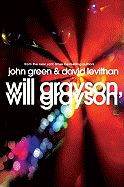
This may well be the best novel that either John Green (Paper Towns) or David Levithan (Boy Meets Boy; Nick and Norah's Infinite Playlist, with Rachel Cohn) has written. And it's certainly the best one they've written together (okay, this is their first collaboration as a writing team). The alternating first-person narratives of two characters named Will Grayson (John Green's character) and will grayson (David Levithan's) combine in a seamless whole to describe how their chance meeting in a Chicago porn shop changes both of their lives. In the first chapter, Green's Will Grayson introduces his best friend since fifth grade, the physically gigantic as well as larger-than-life Tiny Cooper, who is not only the best member of their high school football team's offensive line, but is also writing a musical about being gay. Behind all his flash, Tiny just wants to be in love and have that love returned. Then there's Levithan's will grayson, who lives in the suburbs and arrives in Chicago to meet up with Isaac, whom he met online, at Frenchy's, the porn shop.
The two Will Graysons meet in the porn shop because things don't go as either of them had planned. Struck by the coincidence of sharing a name, they confide in each other about their plans gone astray. In a great exchange that they circle back to at several points in the novel, will grayson says to o.w.g. ("other will grayson"): " 'you know what sucks about love?' 'o.w.g.: what?' 'me: that it's so tied to truth.' " Green and Levithan have each explored the idea of unrequited love before. Here they go further: they explore the notion of idealized love. Because so much of adolescence is about discovering who we are, so, too, the objects of our affection are often about who we want them to be. The truth that lies at the core of this novel is that we must know ourselves before we can truly love another.
This is not a novel about gay people and straight people so much as it is an exploration of the qualities of a true friendship and what kind of relationship brings out the best in us. It's also a very funny novel, initially riddled with the self-deprecating humor that teens use as a survival tactic in the cutthroat realm of high school and later infused with a comic sense that stems from self-acceptance (such as a hilarious scene in which will grayson comes out to his fellow mathletes). And both authors could double as lyricists. If the ending is a bit over the top, well, that's just the way Tiny would want it. And it takes nothing away from the big-hearted theme at this inventive and insightful novel's center--that no love is a threat to anyone else's; there's plenty to go around for everyone. --Jennifer M. Brown

